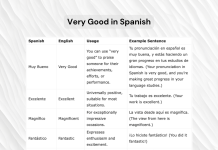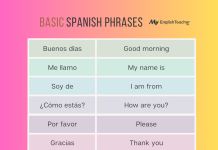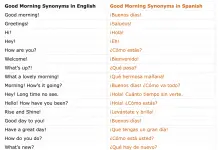Hi in Spanish
| Hi in English | Hi in Spanish |
| Hi! | ¡Hola! |
| Hello! | Hola! |
| Hey! | ¡Eh! |
| Hi. How are you? | Hola. ¿Cómo estás? |
| Good Morning! | ¡Buenos días! |
| Good Afternoon! | ¡Buenas tardes! |
| Good Evening! | ¡Buenas noches! |
| Greetings! | ¡Saludos! |
| Hi. My name is… | Hola. Mi nombre es… |
| Hi beautiful! | Hola, hermosa. |
| Hi mom! | ¡Hola mamá! |
| Hi handsome! | ¡Hola guapo! |
| Hi everyone! | ¡Hola a todos! |
| Hi there! | ¡Hola, hola! |
| Hi guys! | ¡Hola, muchachos! |
| Hello my friend! | ¡Hola mi amigo! |
| Hello my love! | ¡Hola mi amor! |
| Hello, nice to meet you! | Hola, encantado de conocerte. |
| Hi, what’s up? | Hola, ¿qué pasa? or Hola, ¿Qué tal? |
| Good morning sunshine! | ¡Buenos días, sol! |
| Hi, it’s me again! | ¡Hola, soy yo otra vez! |
| Hey, did you have your first coffee already? | Oye, ¿ya te has tomado tu primer café? |
| Happy Monday! | ¡Feliz lunes! |
| Say hi to Ana from me. | Saluda a Ana de mi parte. |
| Send Ana my love. | Envíale a Ana mi amor. |
| Tell Ana I send kisses. | Dile a Ana que le mando besos. |
| Hi, it’s very nice to meet you. | Hola, es un placer conocerte. |
| Hi, I’ve heard great things about you. | Hola, he oído grandes cosas sobre ti. |
| Hi. Long time no see! | Hola. ¡Cuánto tiempo sin verte! |
| Hi! My house is your house. | ¡Hola! Mi casa es tu casa. |
| Hello, where are you from? | Hola, ¿de dónde eres? |
| Tell her I said Hi | Dile que le mando saludos. |
| What’s up? How are you? | ¿Qué tal? |
Bye in Spanish
| Bye in English | Bye in Spanish |
| Bye! | ¡Adiós! |
| Goodbye! | ¡Adiós! |
| See you soon! | ¡Hasta pronto! |
| I leave now | Me voy ahora. |
| See you later! | ¡Hasta luego! |
| Bye, Have a good day! | Adiós, que tengas un buen día. |
| Take care! | ¡Cuídate! |
| God bless you! | ¡Dios te bendiga! |
| I am out of here. | Me voy de aquí. |
| Good night! | ¡Buenas noches! |
| Farewell! | ¡Adiós! |
| Let’s keep in touch! | ¡Mantengamos el contacto! |
| Ciao! | Ciao! |
| See you tomorrow! | ¡Hasta mañana! |
Spanish Greetings
Ways to say Hi in Spanish
Hola!
This is a casual ‘Hi’ or ‘Hello’. It’s short, simple and you can say it to anyone. A friend, a family member, a coworker. Really to anyone.
¡Eh!
‘Hey’ is a very informal way to greet someone. Say it to your close friends and family members. Use ‘Hey’ also to get someone’s attention.
Hola. ¿Cómo estás?
‘Hi. How are you?’ is a casual way to say hi to anyone you meet during the day. Asking how they are or how they feel makes the greeting even more friendly.
¡Buenos días!
‘Good Morning!’ is a phrase you will normally use in the mornings with your loved ones and friends, or coworkers.
¡Buenas tardes!
‘Good Afternoon!’ is a greeting to use after 12:00 am. It is both formal and informal.
¡Buenas noches!
Use ‘Good Evening!’ greeting after 18:00 pm. It sounds good in formal and informal conversations.
¡Saludos!
‘Greetings!’ is more formal. Plus you can use ¡Saludos! to greet many people at once.
Hola. Mi nombre es…
Use ‘Hi. My name is…’ in informal situations. When you want to get to know someone. For example in a coffee house.
Hola, hermosa
‘Hello, beautiful.’ We would use this to greet someone we are romantically involved in. It’s a very forward expression where you admire someone’s beauty. So we don’t use it casually and with people we don’t know. Unless you’re trying to be flirty.
Hola mama
‘Hi mom’ is a casual greeting for your mother. Very informal and most often used when you’re not at the same place as your mother. Maybe talking over the phone.
Hola guapo
‘Hi handsome’ is very similar to ‘Hello beautiful,’ but it’s specific because we say it to men. Men, women, and trans people can be beautiful, but in general, men are considered handsome. It’s used when you’re familiar with someone, involved with them, or when you’re being flirty.
Hola a todos
This means ‘Hello everyone.’ It’s a very casual greeting for multiple people. We use it commonly when you enter a full room, or when you’re having an online call with multiple people. A simple way to greet every person you’re talking to without singling anyone out.
Hola, hola
‘Hi there’ is one of the most casual ways of greeting someone. It doesn’t describe any prior relationship specifically. So it can be used to greet anyone, from a friend you’ve seen many times, to someone you’ve only just met.
Hola, muchachos
This means “Hi guys,’ but it doesn’t refer to men in particular. It’s also very casual, so it can mean a group of people. Since it’s usual to refer to a group of people as ‘guys’ simply because of popular culture, you can use it to greet any group of people, men or mixed. If you want to be specific you can use to greet a group of male friends, or men you are familiar with.
Hola mi amigo
‘Hello my friend,’ is a way to say Hi to someone you know closely. We use it to greet our friends, and not someone you just met. It’s a fairly intimate greeting that is reserved for those close to you.
Hola mi amor
This means ‘Hello my love,’ and it’s a very specific greeting for someone you love. We say Hi this way to someone we are romantically involved with. This is the most common use. However, you can also use it for a very close friend, or best friend. Love can mean many things, so some people use it to say Hi to a friend they love most in life.
Hola, encantado de conocerte
‘Hello, nice to meet you,’ is a way to say hi to someone you just met. You don’t know this person from before, so in order to be polite and nice you say that it’s nice to meet them. It’s good for any situation where you’re meeting a new person.
Hola, que pasa
‘Hi, what’s up,’ is a very casual greeting. We use it to say Hi to anyone we know from before. It can be just one person, or a group of people. Use it in any occasion where the atmosphere is comfortable, and you know all or most of the people you’re greeting.
Buenos dias, sol
This means ‘Good morning sunshine,’ and we use it to greet someone in the morning. However, we don’t use it with everyone. ‘Sunshine’ is reserved for people you are close to, either as friends, relatives, or someone you are romantically involved with.
Hola, soy yo otra vez
‘Hi, it’s me again,’ is a very common way to greet someone you’re seeing for the second time, or multiple times in a row. It can be used in any situation like that. Like when you’re entering a shop again, or calling someone you just talked to earlier. It’s pretty informal, so you wouldn’t use it a work as much.
Oye, ya te has tomado tu primer cafe
‘Hey, did you have your first coffee already?’ is a way to greet someone you’re familiar with. It’s not just a question, but also in some situations an invitation. You would use it when you want to have a coffee with that person, so you’re asking them if they already had one. Any occasion is good, but make sure there’s some way you can grab a coffee in case the person you’re asking wants one.
Feliz lunes
‘Happy Monday,’ is a fairly uncommon way of saying Hi to someone. It means you are very happy about the day, and you want to make that clear. You can use it to wish someone a ‘Happy Monday,’ but it also means that you hope their week goes well too. Since Monday is the start of the week, and if it goes well maybe the rest will too.
Saluda a Ana de mi parte
‘Say hi to Ana for me,’ is a greeting request. You can use it with any name, but you are asking a person to say hi to someone else for you. You would use it when you’re not sure if you’ll see that person, but you know someone else will.
Enviale a Ana mi amor
‘Send Ana my love,’ is also a greeting request. It’s a very personal one, since you’re asking someone to convey your feelings to that person. This means that you are very close with them, but you’re not sure if you’ll see them soon.
Dile a Ana que le mando besos
‘Tell Ana I send kisses,’ is very similar to ‘Send Ana my love.’ It’s a greeting request that is very personal and emotional. Since you are close to this person you want them to know you’re thinking of them. This can be for a very close friend, or significant other.
Hola, es un placer conocerte
‘Hi, it’s very nice to meet you,’ is a bit more formal than ‘Hi, nice to meet you.’ Here you’re being extra polite and friendly, so it’s a bit more formal. You can use it when introducing yourself to someone new from work, a client, or in general someone you’re doing business with. It can also be used when meeting a blind date, or a friend of a friend.
Hola, he oido grandes cosas sobre ti
This means ‘Hi, I’ve heard great things about you,’ and it’s a very versatile way of saying Hi. We use it when we’re meeting someone we have heard of before. It can be formal or informal, so you can use it on any occasion. It’s just used when you are meeting someone for the first time, and you want to make sure the person knows you have already heard good things about them.
Hola. Cuanto tiempo sin verte
‘Hi. Long time no see’ is a way of saying Hi to someone you know, but haven’t seen in a while. It’s a casual greeting, so use it when you’re familiar with someone. It can be anyone you know, not just friends or family.
Hola. Mi casa es tu casa
“Hi. My house is your house,’ is a casual greeting for a person, or people, who are coming to your house or apartment. It’s an invitation, and it means that you want your guest or guests to feel comfortable. Just like if they are in their own house.
Hola, de donde eres
‘Hello, where are you from?’ is something you ask a person you’ve just met. It’s a very common way of saying Hi when you’re traveling. If you want to get to know a person it’s one of the first questions you can ask.
Dile que le mando saludos
‘Tell her I said hi,’ is another greeting request. It’s very casual because you’re just asking someone to say Hi to someone else in your name. There aren’t many emotions behind it, just a casual greeting to let someone know they’re on your mind.
Ways to say Bye in Spanish
Adios
This can mean ‘Goodbye,’ or the shortened version ‘Bye.’ ‘Goodbye’ is a bit more formal, and you can use it with someone you know maybe only professionally. ‘Bye’ is more informal and casual, meant for people you are already familiar with.
Hasta pronto
‘See you soon’ is a good way of saying Bye to someone you see fairly regularly. It’s casual, not informal or formal. We use to say Bye to someone we either see often, or want to see often. You can use it in any situation.
Me voy ahora
‘I’m leaving now’ is a way to say announce that you are leaving. It’s common and casual, used in any situation. We use it to make sure the person or people you are talking to know you have to leave.
Hasta luego
This means ‘See you later,’ and it’s similar to ‘See you soon.’ However, it’s more informal. You can use this when saying Bye to someone you know. It can mean that you are going to see them soon during the same day, or that you want to see them as soon as possible. It’s commonly used among friends.
Adios, que tengas un buen dia
‘Bye, and have a good day’ is a fairly formal way of saying Bye. It can be used in business meetings, formal dinners, or when you’re saying Bye to someone you know professionally. You wouldn’t generally use it with someone you are close to.
Cuidate
This means ‘Take care,’ and is a very casual way of saying Bye. It’s commonly used and can be used with everyone. It tells the person you wish them well, and it’s good in any situation.
Dios te bendiga
‘God bless you’ is a religious way of saying Bye. This means that you would use it when talking to someone who is religious, or if you are. It’s a way of saying that you hope God watches over them when they leave. It’s good for any situation, as long as the people involved are religious.
Me voy de aqui
‘I am out of here’ is very informal. It’s usually used when talking to friends. It’s a casual way of saying that you are leaving the place. Because it’s so informal and casual it’s best used with people you know well.
Buenas noches
This means ‘Good night,’ and it’s very common. This can be used with anyone, anywhere, as long as it’s night. There is no special occasion or situation where you can’t use it. Well, except when it’s morning or afternoon.
Adios
‘Farewell’ is a very special way of saying Bye. It means that you’re not sure if you will see this person again. ‘Farewell’ is meant to say you with the person safe travels, and that you hope they are well in life after they leave. It’s like a goodbye but for an indefinite amount of time.
Mantengamos el contacto
‘Let’s keep in touch’ is also used in a specific case. This is like saying Bye with ‘Farewell,’ but you want to know how the person is doing after they leave. You don’t know if you will see them again, but you want to know how they are doing regardless.
Ciao
‘Ciao’ comes from Italian, and it’s used in many languages across the world in the same form. It’s a very casual and informal way of saying Bye. You can use it in any situation, as long as you’re familiar with the person.
Hasta manana
‘See you tomorrow’ is a way of saying Bye to someone you know you will see the next day. It’s fairly informal, so don’t use it with your boss, but it’s okay with friends or co-workers. Any situation is fine, from work all the way to a bar.
Learn Spanish
- 30 Happy Birthday Wishes in Spanish
- 40 Ways to Say I Love You in Spanish
- 20 Ways to Say Good Morning in Spanish with Examples
- 7 Days of the Week in Spanish. Months in Spanish. Seasons in Spanish.
- Numbers in Spanish 0-1000
- 15 Ways to Say ‘You are Welcome’ in Spanish
- 50+ Ways to Say Thank You in Spanish
- If I translate Spanish to English on Google translate, is it accurate enough?
- Online Translation from Spanish to English 🇪🇸☕️ Best Service Providers
- Hurry Up in Spanish?
- How do you say Food in Spanish?
- Most popular languages in the world: Chinese, Spanish, English, Hindi, Arabic,…
- Polite in Spanish
- How do you say tree in Spanish?
- How do you say red in spanish?
- What’s up in Spanish slang?
Learn English
- Other words to say hello
- All articles for Hello
- 9 Ways to Say Good Night for Everday
- Other Ways to say Nice to Meet You 🤗🤩😍
- Other Ways to Say Give My Regards 👋🏻 [Formal & Informal]
- What are some good opening Greetings for Emails?
- Formal and Informal Email Phrases – from Greetings to Closing Phrases!
- Common WRITING PHRASES for Business Emails, IELTS, Essays, Reports
- 30 Email Templates for Business Communication
- 15 GOOD LUCK Sayings! Other ways to say ‘Good Luck”
- How To Start An Essay? • Essay topics • What is an essay • Hooks for essays
- Bye Now or Bye For Now? Which one is correct?
- Different Ways to Say BYE BYE!
- Good Riddance Meaning. Is it Nice to Say it?
- What country does the word Espresso come from?
- Are Idioms and Expressions the same thing?
- Idiomatic Definition ›› 15 Idiomatic Expressions with Eye
- 12 work idioms and expressions ›› 27 work collocations ›› 8 work phrasal verbs
- 9 Weird but Common British Expressions IllustratedDialogue Expressions of Asking and Giving Opinion!
- TO DO or TO MAKE a project? List of Do & Make Expressions
- Polite Expressions in English: Words, Phrases and Questions to be Kind
- 10 Common English Expressions with Explanation (Video)
- 50 Popular English Idioms to Sound Like a Native Speaker
- Formal and Informal Email Phrases – from Greetings to Closing Phrases!
- Tell me about yourself: How to introduce yourself in English: Tips and Phrases
- I You He She It and They are called Personal Pronouns
- A BIG List of All PRONOUNS
- ESL Apps: 15 English Language Learning Apps for iPhone and Android
Browse by Category
A Adjectives B Business English C D dictionary E English grammar English Idioms English language English Learning Tips English phrases English teacher English Vocabulary English Vocabulary English words F G H how to learn english I idioms Infographic J L Learn English M N noun O P phrasal verb R S Skype T teach English Teaching English as a foreign language Text Abbreviations The Jungle Book tips U W Y
- Abbreviations
- acronyms
- Advanced English Lesson
- Adverbs
- Apps
- Arabic
- Articles
- Beginner English
- Books
- Business English
- Clauses
- Collocations
- Conjunctions
- Difference Between
- English Grammar
- English Idioms
- English Learning Tips
- English Questions and Answers
- English Speaking
- English Test
- English Videos
- English Vocabulary
- English Vocabulary Dictionary
- English Writing
- For Kids
- For Teachers
- French
- Games
- German
- Hindi
- Hungarian
- IELTS
- Infographics
- Intermediate English
- Italian
- Japanese
- Learn English
- Listening Skills
- Lyrics
- Names
- Phrasal Verbs
- Portuguese
- Prefix
- Prepositions
- Proverbs
- Q&A
- Quiz
- Quotes
- Russian
- Should
- Spanish
- Suffix
- Synonyms
- Teach English
- Technology
- Uncategorized
- Understanding
- Useful English learning websites
- Vietnamese
Latest Posts
- Supposition Meaning
- Summary of how Components of Health are related to Wellness
- Understanding the Extroverted Introvert
- Very vs Vary: Understanding the Difference
- Inspiring Introvert Quotes for Quiet Reflection
Latest Comments

Hello. Thank you very much for the most detailed and clear explanation! Could you please comment on this sentence where…

“Hey there! Just wanted to send you a bunch of good luck vibes as you go for captain of the…

i need a good luck message for a teen trying out for captain of the drill team with the word…

Very useful for learning english language. Thank you!

thanks for post


























